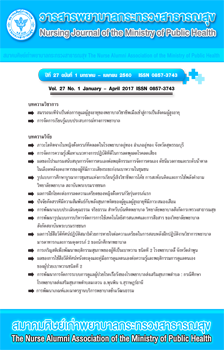การเจริญสติเพื่อพัฒนาพฤติกรรมสุขภาพของผู้ที่เป็นเบาหวาน ชนิดที่ 2 โรงพยาบาลลี้ จังหวัดลำพูน
Main Article Content
Abstract
บทคัดย่อ
เบาหวานเป็นโรคเรื้อรังที่รักษาไม่หายขาด ผู้ที่เป็นเบาหวานจึงต้องมีพฤติกรรมสุขภาพที่เหมาะสมในการควบคุมระดับน้ำตาลในเลือดและป้องกันการเกิดภาวะแทรกซ้อน การวิจัยครั้งนี้มีวัตถุประสงค์เพื่อ ศึกษาผลการเจริญสติต่อพฤติกรรมสุขภาพของผู้ที่เป็นเบาหวานชนิดที่ 2 เป็นการศึกษากึ่งทดลองชนิดสองกลุ่มทดสอบก่อนและหลัง กลุ่มตัวอย่างคือ ผู้ที่เป็นโรคเบาหวานชนิดที่ 2 ที่มารับการรักษาที่คลินิกเบาหวาน แผนกผู้ป่วยนอก โรงพยาบาลลี้ จังหวัดลำพูน โดยเลือกกลุ่มตัวอย่างตามเกณฑ์ที่กำหนด จำนวน 30 ราย จัดให้เป็นกลุ่มทดลองจำนวน 15 ราย และกลุ่มควบคุม 15 ราย กลุ่มทดลองได้รับกิจกรรมประกอบด้วยการเข้าร่วมฝึกการเจริญสติ เป็นเวลา 3 เดือน ในขณะที่กลุ่มควบคุมได้รับการพยาบาลตามปกติ การประเมินผลกระทำภายหลังได้รับการเจริญสติในสัปดาห์ที่ 12 โดยใช้แบบสัมภาษณ์การดูแลตนเองของผู้ป่วยเบาหวานชนิดไม่พึ่งอินซูลิน วิเคราะห์เปรียบเทียบคะแนนพฤติกรรมสุขภาพระหว่างกลุ่มโดยใช้สถิติการทดสอบค่าที (t-test)
ผลการวิจัยพบว่า
1. หลังเข้าร่วมการเจริญสติ ผู้ที่เป็นเบาหวานชนิดที่ 2 ในกลุ่มทดลองมีค่าเฉลี่ยคะแนนพฤติกรรมสุขภาพสูงกว่าก่อนได้รับการเจริญสติอย่างมีนัยสำคัญทางสถิติ (p< .01)
2. หลังเข้าร่วมการเจริญสติ ผู้ที่เป็นเบาหวานชนิดที่ 2 มีค่าเฉลี่ยคะแนนพฤติกรรมสุขภาพสูงกว่ากลุ่มที่ได้รับการพยาบาลตามปกติอย่างมีนัยสำคัญทางสถิติ (p<.01)
ผลการวิจัยแสดงให้เห็นว่าการเจริญสติเป็นเครื่องมือที่ช่วยให้ผู้ป่วยเบาหวานปรับเปลี่ยนพฤติกรรมสุขภาพได้ จึงควรนำมาประยุกต์ใช้ร่วมกับการพยาบาลตามปกติเพื่อส่งเสริมให้ผู้ที่เป็นเบาหวานชนิดที่ 2 มีพฤติกรรมสุขภาพที่เหมาะสมสามารถควบคุมระดับน้ำตาลในเลือด ป้องกันภาวะแทรกซ้อนและมีสุขภาพที่ดี
Mindfulness Meditation on the Health Behavior of Persons with Diabetes Type 2, Li Hospital, Lamphun Province*
Chucheap Phochaja**
ABSTRACT
Diabetes Mellitus is a chronic disease that cannot be cured. Persons with diabetes require appropriate health behaviors in order to control blood glucose level and prevent complications. The purpose of this study was to evaluate the effects of Mindfulness Meditation on the health behavior of persons with Diabetes type 2. A quasi-experiment with a two-group, pre-test and post-test design was used. A purposive sampling technique was used to recruit 30 subjects from an out-patient diabetes clinic at Li hospital, Lamphun Province. Of these, 15 were assigned to an experimental group and 15 were assigned to a control group. The experimental group received an intervention consisting of three months of Mindfulness Meditation, whereas the control group received conventional care. The evaluation of this study was conducted after 12 weeks receiving intervention using the Self-care Practices of Non-insulin Dependent Diabetes Mellitus Interviewing Questionnaire. Comparisons of health behavior scores between the two groups were analyzed using t-tests.
The results revealed that:
1. Health behaviors mean score of the experimental group after participating in the Mindfulness Meditation program was significantly higher than that of before (p<.01).
2. Health behaviors mean score in the experimental group after participating in the Mindfulness Meditation program was significantly higher than that of the control group (p<.01).
The results of this study demonstrated that Mindfulness Meditation can be used to enhance health behaviors of persons with Diabetes Type 2. Therefore, Mindfulness Meditation should be integrated into the provision of routine care of persons with diabetes mellitus in order to control their blood sugar levels, prevent complications, and improve their overall health.
Article Details
บทความและรายงานวิจัยในวารสารพยาบาลกระทรวงสาธารณสุข เป็นความคิดเห็นของ ผู้เขียน มิใช่ของคณะผู้จัดทำ และมิใช่ความรับผิดชอบของสมาคมศิษย์เก่าพยาบาลกระทรวงสาธารณสุข ซึ่งสามารถนำไปอ้างอิงได้

